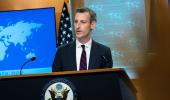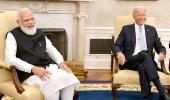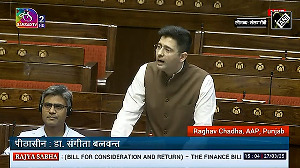'At the heart of the strategic relationship between our countries are economic ties.'
US Secretary of State Antony J Blinken charts out the route for the 'defining relationship' of the 21st century on the eve of Prime Minister Modi's State visit to the US next week.

So we are here almost literally on the eve of what we believe will be a historic State visit by Prime Minister Modi, one that will further solidify what President Biden has called the 'defining relationship' of the 21st century.
Now, this is not something that the President came to yesterday. I've had the immense privilege and pleasure of working for the President for more than 20 years, going back to his time as chairman of the Senate Foreign Relations Committee.
And from that time, I know the premium he's attached to the relationship between our countries and the vision that he's had for the centrality, the importance, of that relationship.
The road that we've traveled over the last 25 years has been quite extraordinary, and I think it's a testament to the importance that we attach to the relationship that it's a road that has gone through multiple administrations, Democrat and Republican.
We continue to move further down the road of strengthening the partnership between our countries.
We saw that in the final years of the Clinton administration, through the Bush administration, the Obama administration, the Trump administration, and now the Biden administration.
Simply put, we see this defining relationship as a unique connection between the world's oldest and largest democracies, with a special obligation now to demonstrate that our governments can deliver for and empower all of our citizens.
We see all of this in the deep bonds between our people who participate in exchange programs, stream shows like Padma Lakshmi's Top Chef -- I know there are a few folks in the audience who do that -- but maybe most important here in the United States an Indian American diaspora over 4 million strong and growing stronger every day.
We see the importance of the partnership in a shared commitment to address regional and global challenges -- promoting health security, working with our Quad partners to build a free, open, secure, prosperous Indo-Pacific where people, where goods, where ideas can travel freely and rules are applied fairly.
I have witnessed India's constructive leadership on these issues up close these last two-and-a-half years, and I see it in their ambitious agenda at this year's G20; in our new I2U2 group with India, with Israel, with the UAE, the United States; and in probably more than a dozen meetings that I've had with my counterpart, my colleague, my friend, Foreign Minister Jaishankar.
I've had the opportunity now to make several trips to India in this job, including one in March where I actually took an auto-rickshaw ride that probably gave my security detail a little bit of concern. (Laughter.) But we made it through.
But the reason this evening is so important is our conviction that at the heart of the strategic relationship between our countries are economic ties.
And under the leadership of President Biden and Prime Minister Modi and private sector leaders in this room tonight and beyond, it is growing stronger by the day.

Last year, as you all know, trade between our nations reached a record $191 billion, making the United States the largest trading partner for India.
American companies have now invested at least $54 billion in India, from manufacturing to telecommunications.
In the United States, Indian companies have invested over $40 billion in IT, in pharmaceuticals, and more, supporting 425,000 jobs from California to Georgia.
Just this February, Air India announced the historic purchase of more than 200 Boeing aircraft, which will support an estimated 1 million-plus jobs across 44 of the United States.
Both the US and India are making transformative investments in our own countries to build our own strength -- President Biden's $1.2 trillion Bipartisan Infrastructure Law, followed after that by the CHIPS Act, and as well the Inflation Reduction Act; Prime Minister Modi's 100 trillion rupee infrastructure plan.
All of this will make our economies more productive and more attractive for investors.
And India has joined three pillars of our new Indo-Pacific Economic Framework -- committing to build more resilient supply chains, to seize clean energy opportunities, and to combat corruption and other challenges that undermine the efforts of our governments.
Together, we're helping to shape the innovations of the future, but not just the innovations themselves, also - and this is so critical -- the norms, the standards, and rules that govern them, from artificial intelligence to quantum computing.
In January, this council co-hosted a roundtable where our two governments inaugurated a new initiative on Critical and Emerging Technologies.
We're elevating and expanding the strategic technology partnership between governments, but also between businesses, between academic institutions in both our countries - because we believe how technology is designed, how it is used should be informed by democratic values and respect for human rights.

Central to all of this cooperation is diversifying and deepening our supply chains with trusted countries, while also reducing strategic dependencies.
My friend and colleague Secretary of Commerce Raimondo and her counterpart Minister Goyal recently established a partnership to make our semiconductor supply chains more resilient.
In Tamil Nadu, the US International Development Finance Corporation provided $500 million to help a leading American company build a solar manufacturing facility.
This project will power roughly 30 million lightbulbs in homes, in schools, in businesses across India; it will create over a thousand jobs for Indians and Americans; and maybe most significantly, it will shift a key component of our clean energy supply chains to a close partner.
That's what we mean when we say we are building more resilient, more diversified supply chains.
Finally, we are investing in our people. The US and India's education systems have produced the leaders of some of our most iconic companies -- from Google to Infosys to -- not to mention former Mastercard CEO Ajay Banga, who is now, of course, the new president of the World Bank and onetime president of the USIBC.
Indian Americans have created a third -- a third -- of all immigrant-founded startups in the United States.
Think about that for a minute. That is extraordinarily powerful. (Applause.)
And maybe most significant for the future -- for the future of ties between our countries -- we have more than 200,000 Indians studying in American universities, making India the second-largest source of international students in the United States, and we want to continue encouraging that remarkable dynamism.
This is how you build the bridges of the future.

At Howard University last year, when Foreign Minister Jaishankar was visiting, the two of us went there together and we announced an Education and Skills Development Working Group to try to address skills gaps, to promote vocational training, to spur entrepreneurship in our countries.
Whether it's investing and inventing new technologies, whether it's combating the climate crisis, whether it's helping to build more inclusive economies, I have tremendous confidence that the rising generation of Indians, the rising generation of Americans will take the relationship between us to new heights.
And in doing that they will not only benefit our countries, they will benefit the entire world.
Now, we know that India and the United States are big, complicated, countries.
We certainly have work to do to advance transparency, to promote market access, to strengthen our democracies, to unleash the full potential of our people.
But the trajectory of this partnership is unmistakable, and it is filled with promise.
It's being written in places like North Carolina, where our growing engagement is benefiting both our countries.
The Tar Heel State has become a hub for Indian investment, with tech companies like HCL creating 2,400 jobs, training American high schoolers for IT careers.
Meanwhile, Charlotte-based Honeywell is employing 13,000 people from Kolkata to Mumbai, making safer airplanes, making energy-efficient buildings.
Duke University has established a presence in Bangalore, strengthening academic and research exchanges between our people.
Commenting on this explosion of US-India commercial activity, one North Carolina entrepreneur from Gujarat observed, and I quote, "This could not have happened 15 years ago."
And that's an important comment, because it puts a fine point on the fact that the evolution in this relationship just over the past couple of decades has been extraordinary.
And in the day-in/day-out, it's easy sometimes to lose sight of that.
It's also why a moment like this evening and a moment like next week is so important.
It's an opportunity to put where we are, where we've come from, and where we're going in perspective.
And so I couldn't be more pleased to actually kick off tonight the upcoming State visit with all of you.
This is really what our growing relationship is all about, and so much of it goes to the tremendous work that all of you are facilitating.
I talked about that we couldn't imagine this 15 years ago.
What I'm now trying to imagine and what I know you're all working on -- not only imagining but bringing to life -- is what this is going to look like 15 years from now or 50 years from now, and all the benefits that it will bring to Indians and Americans alike.
United States Secretary of State Antony J Blinken delivered these remarks at the US-India Business Council's India Ideas Summit in Washington, DC, June 12, 2023.
Feature Presentation: Aslam Hunani/Rediff.com











 © 2025
© 2025